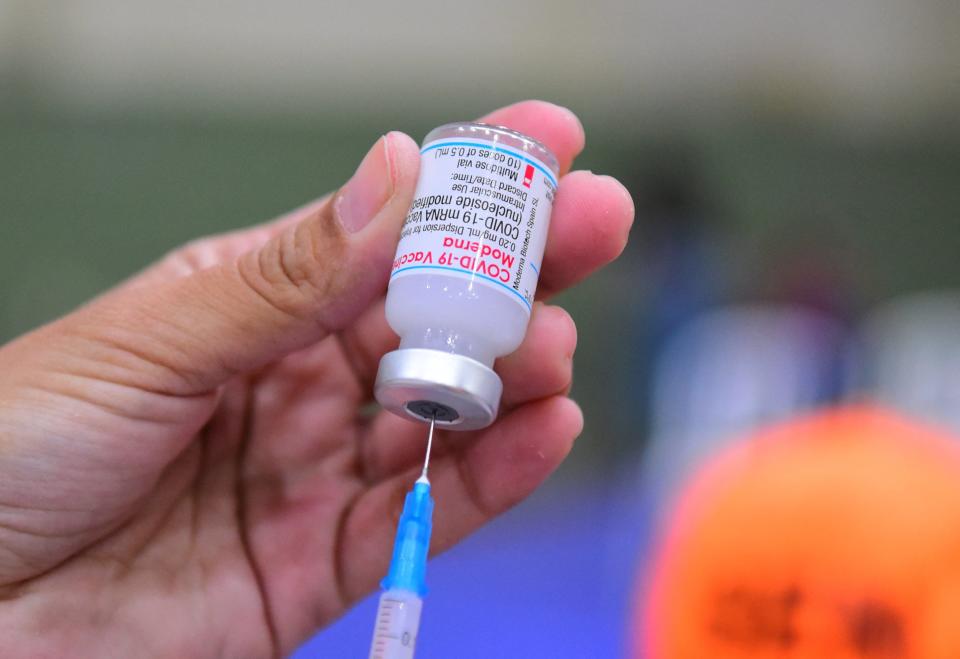COVID vaccine tensions preview 'racial generation gap' and a competition for resources
With the new Delta COVID-19 variant spreading rapidly and vaccine boosters a distinct possibility, a new scramble for shots could well re-ignite last December’s somewhat backstage policy debates over whether to prioritize age or race in allocating initial supplies of COVID-19 vaccines. These little-noticed skirmishes in Washington and state capitals preview deeper political conflicts stemming from what politically-attuned demographers term a “racial generation gap.”
This sociological San Andreas fault line potentially pits different interests of an older, disproportionately white generation against those of a younger, much more multi-ethnic population. A primary fear has been a future funding feud between “senior power” (high-turnout older white voters and advocates like AARP) mobilizing to maintain Medicare, Social Security and public pension systems versus younger minorities seeking social justice via better job opportunities, schools, parks, day care and other services for young families.
Senior citizens vs. essential workers
Instead, the first rumblings along this racial-generational divide occurred last fall when the Centers for Disease Control and Prevention’s Advisory Committee on Immunization Practices (ACIP) ranked groups for initial limited supplies of COVID-19 vaccine. The key dilemma: Should an older, disproportionately white population (more at risk to dying of the disease) be prioritized over those in minority-heavy service occupations (more likely to contract and spread COVID and its mutations)?
USA TODAY's opinion newsletter: Get the best insights and analysis delivered to your inbox.
Seniors ultimately prevailed in these initial skirmishes – but barely. The early vaccine debates demonstrated that senior power is more a threat than reality. In the prevailing woke culture of the nation’s establishment, race trumps age. Vaccine politics showed that seniors have surprisingly few friends in high places; political allies wavered and wilted. The aging 1960s protest generation needs a refresher course on consciousness-raising and mobilization.
Indeed, last fall ACIP initially omitted older Americans entirely from the second highest vaccine 1b priority category – just below the top 1a tier of frontline healthcare workers and nursing home employees and residents. Instead, the committee elevated “essential worker” categories containing significant numbers of younger, ethnic minority service workers unable to work from home. While most European nations quickly prioritized age in distributing vaccines, ACIP’s ethical framework emphasized “maximizing benefits, minimizing harm, promoting justice and mitigating health inequities.”

But racial rationing posed legal and public relations problems. Word leaked out that the advisory committee was nudging communities of color toward the front of the vaccination line while pretending it wasn’t. ACIP’s chair vigorously denied this, but a public backlash ensued that resulted in a late December compromise whereby Americans over 75 were finally added to the 1b group.
Politicians were more wary of rousing the sleeping giant of senior voting power. The governors of Texas and Florida immediately defied the CDC guidelines, placing citizens over age 65 in the 1b category. With some variations, so did 23 other states and the Trump White House.
Virginia fails to protect the elderly: My parents caught COVID while vaccines languish unused
The AARP is generally viewed as a lobbying juggernaut for seniors. But on vaccine priorities, it was evidently torn between competing commitments to advocate for Americans over age 50 while also trumpeting support for diversity and equity. Its public pronouncements were surprisingly ambivalent, more muted than militant.
Calls to pay heed to seniors’ high death rates were muddled by simultaneous warnings about “fair and equitable allocation” and close monitoring by race and ethnicity. (On CBS’s “Face The Nation,” AARP CEO Jo Ann Jenkins dodged a question as to whether she would advise all governors to immediately prioritize Americans over age 65.)
Older Americans must mobilize better
By March, low vaccination rates for Blacks and Latinx revived several governors’ original priorities for ethnic equity. In mid-March, California Gov. Gavin Newsom reserved 40% of all new vaccine doses for “hardest hit communities” (heavily minority) as determined by a “Healthy Places Index.” Vermont Gov. Phil Scott directly prioritized individuals who identify as “Black, Indigenous or a person of color (BIPOC).” And a “60 Minutes” report tarred Florida Gov. Ron DeSantis’ “seniors first” vaccine distribution as heavily favoring wealthy white communities at the expense of poor and minority areas, partly through an alleged “pay to play” system for DeSantis campaign donors.
Aging Americans must mobilize more effectively. Age discrimination remains the most acceptable form of prejudice and boomers, especially, are not well-liked. Indeed, seniors’ slim vaccine victories reinforced stereotypes of aging boomers as privileged, powerful and selfish – satirized in a recent "Saturday Night Live" musical sketch, “Boomers Got the Vax.”
Not a joke: We need a new Surgeon General’s warning: 'Ageism is dangerous to your health'
But aging Americans are a surprisingly varied and vulnerable population: 28% have no retirement savings and another 17.3% have saved less than $10,000. Boomers will be as dependent as their parents on Social Security and Medicare. And these entitlements almost certainly will be targeted when a severe economic downturn arrives – as it surely will.
The lesson of pandemic politics is that aging Americans lives’ may literally depend upon them becoming a more politically aware, active and vocal voting bloc. Seniors must especially cultivate and support congressional champions of aging Americans, like the late Rep. Claude Pepper of Florida and Sen. Ted Kennedy of Massachusetts. And more members members of the current Congress should consider accepting the challenge and honor of filling those legends’ shoes.
Frederick R. Lynch is a government professor at Claremont McKenna College and the author of “One Nation Under AARP: The Fight over Medicare, Social Security and America’s Future.” Follow him on Twitter: @FrederickRLynch
You can read diverse opinions from our Board of Contributors and other writers on the Opinion front page, on Twitter @usatodayopinion and in our daily Opinion newsletter. To respond to a column, submit a comment to letters@usatoday.com.
This article originally appeared on USA TODAY: COVID vaccine boosters might reignite the fight for vaccines

